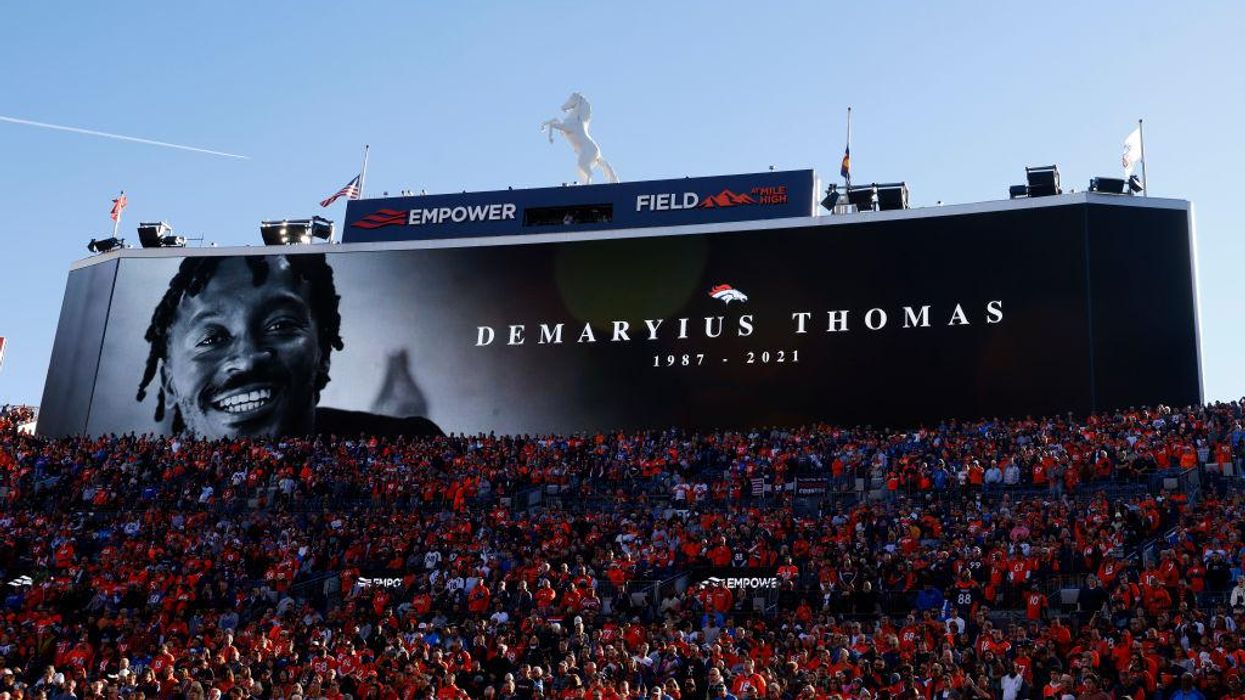
Justin Edmonds/Getty Images

The outpouring of public emotion in reaction to the tragic and unexpected passing of former Broncos receiver Demaryius Thomas has made me ponder our fixation with and attitude toward death.
Thomas, 33, died late last week in his Georgia home. Reports indicate that he suffered a seizure while showering and died of cardiac arrest. For a four-year stretch, Thomas was quarterback Peyton Manning’s favorite target in Denver and one of the NFL’s five or six best receivers. In 2016, thanks to the heroics of the Denver defense, Manning, Thomas, and the Broncos won a Super Bowl title.
Demaryius Thomas was a very good football player. Like Vincent van Gogh, Thomas’ premature death elevated his stature in modern American culture.
I do not write that to denigrate Thomas or his legacy. Demaryius Thomas lived a truly fascinating and inspiring life. His short narrative arc is worthy of a chapter in the Bible. He was born to a 16-year-old mother and a father who left him to join the military. Thomas and his mother shared a trailer in the woods of rural Georgia. His mother and his maternal grandmother were small-time crack cocaine dealers. When Thomas was 11 years old, law enforcement busted up his grandmother’s drug ring, sentencing his grandma to life in prison and his mama to 24 years. To remain loyal to her mother, Thomas’ mother turned down a plea deal that would have gotten her four years.
Demaryius Thomas’ rise from poverty and dysfunction was a modern miracle worthy of a movie. The impact and importance of his life far exceeded his death.
But our modern, secular culture celebrates death more than life. Or at least that’s the way it feels in 2021.
I want to be transparent about this. This column is more stream of consciousness than fully formed opinion or belief. I’m inviting you to help me think this through.
I’ve been pondering this topic for more than two years. It started in 2019 when the rapper Nipsey Hussle was murdered. Corporate and social media responded to Hussle’s death as if it were a second assassination of Tupac Shakur. Shakur was a transcendent rapper with an international audience. He starred in movies. He was a household name.
Nipsey Hussle was a local rapper. He was Los Angeles’ version of Young Dolph, the local rapper no one outside Memphis had heard of until he was murdered in mid-November. Tomorrow Memphis is holding a celebration of life event at FedExForum in honor of Young Dolph. Tickets sold out in less than 90 minutes. Memphis renamed a street to honor Young Dolph.
Young Dolph was a cliche, mediocre rapper. He rapped about dealing drugs, b***hes, hoes, and the usual. Had he not been killed, no one outside Memphis would know him.
I don’t want to denigrate Young Dolph. I’m trying to understand our fixation on and relationship with death. I get and accept death’s ability to exonerate and cleanse. Should it exalt?
George Floyd’s criminal past became irrelevant the moment police handcuffed and subdued him to the point that he no longer posed a threat to them, the public, or himself. Floyd’s criminal past does not justify Derek Chauvin kneeling on his neck and back area for nine minutes. But Floyd’s death does not justify the exaltation that has been showered on him. The statues, memorials, and reverence are misguided and inappropriate. We’ve turned George Floyd into an idol.
We’ve done this because our modern, secular culture places more importance on death than on life. Our modern, internet-driven society attaches our emotions and attention to people we do not know. Many of us have shed as many tears over distant internet idols like Floyd, Nipsey, and Young Dolph as over family members and friends, the people we actually know, engage, and live with. It’s unhealthy. It’s unnatural.
Our values are upside down. We’re chasing the approval of man, not God. This is why corporate media constantly talks about being on the right side of history. History is written by man. It’s written by the people in power. What made America great, what pushed this country to address its sins, was the pursuit of being on the right side of God.
Man’s history can be rewritten in an election cycle. It can be manipulated and redefined by a Google algorithm. God’s truth is unshakable.
I don’t have this figured out. I wanted to start a conversation today. I want you to help me figure out what’s not right about how we view death, how we respond to death, and why we seem far more fixated on death than on life.
The threat of death is being used to impose fear and make heroes of unworthy men.
Please drop me an email with your thoughts at BallState68@aol.com.Jason Whitlock
BlazeTV Host